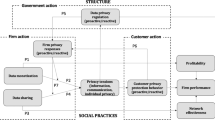Abstract
Many observers consider traditional intermediaries such as brokers, lenders and salespersons anachronisms in a world where consumers can communicate directly with providers of products and services over computer networks. Under the same rubric, information mediators such as journalists, editors, librarians and customer support representatives are being targeted for elimination. Drawing on our ethnographically-informed studies of customer support analysts and librarians, we demonstrate that the expertise and experience of intermediaries is often invisible – to the consumer, to the organization in which these intermediaries work, and even to the intermediaries' managers. The valuable services provided by intermediaries are not made unnecessary by end-user access. We argue for a richer understanding of intermediation, and a reallocation of functions and roles in which “new intermediaries” – people, software or a combination of the two – aggregate, personalize and assure the quality of information.
Similar content being viewed by others
References
Baba, M.L. (1995): Work and Technology in Modern Industry: The Creative Frontier. In Frederick C. Gamst (ed.): Meanings of Work: Considerations for the 21st Century. Albany SUNY Press.
Basch, R. (1993): Secrets of the Super Searchers. Wilton CT: Eight Bit Books.
Bock, G.E. (1997): Knowledge Management Frameworks: Applications for Structuring Connections from Data Fellows, Inference Corporations, and Knowledge X. Patricia Seybold Group's Workgroup Computing Report, vol. 20,no. 2.
Bowers, J., G. Button and W. Sharrock (1995): Workflow from Within and Without: Technology and Cooperative Work on the Print Industry Shopfloor. In H. Marmolin, Y. Sundblad and K. Schmidt (eds.): Proceedings of the Fourth European Conference on Computer-Supported Cooperative Work, ECSCW '95 (Stockholm, Sweden). Dordrecht: Kluwer Academic, pp. 51–66.
Cook, S.N.D and J.S. Brown (1997): Bridging Epistemologies: The Generative Dance Between Organizational Knowledge and Organizational Knowing. In Review.
Cordell, A. (1997): Taxing the Internet: A Proposal for a Bit Tax. Presented at Multi-Jurisdictional Taxation of Electronic Commerce. Spring Symposium, April 5, Harvard Law School.
Dolberg, S., John C. McCarthy and M. Mavretic (1996): Building Internet Commerce. The Forrester Report: Software Strategies, August.
Ehrlich, K. and D. Cash (1994): Turning Information into Knowledge: Information Finding as a Collaborative Activity. In J.L. Schnase, J.L. Leggett, R.K. Furuta and T. Metcalfe (eds.): Proceedings of Digital Libraries '94 (College Station, TX). pp. 119–125.
Ehrlich, K. and D. Cash (1995a): I Am an Information Waitress: Bringing Order to the New Digital Libraries. Lotus Internal Report.
Ehrlich, K. and D. Cash (1995b): Credibility, Trust and Information Filtering. Lotus Internal Report.
Erickson, T. and G. Salomon (1991): Designing a Desktop Information System: Observations and Issues. In S.P. Robertson, G.M. Olson and J.S. Olson (eds): Proceedings of CHI '91 Human Factors in Computing Systems (New Orleans, 1991). Addison-Wesley, pp. 49–54.
Fish, R.S., R.E. Kraut and R.W. Root (1992): Evaluating Video as a Technology for Informal Communication. In P. Bauersfled, J. Bennett and G. Lynch (eds.): Proceedings of CHI '92 Human Factors in Computing Systems (Monterey, 1992). Addison-Wesley, pp. 37–48.
Gates, B. (1995): The Road Ahead. New York, NY: Viking.
Hagel, J. and A.G. Armstrong (1997): Net Gain: Expanding Markets Through Virtual Communities. Cambridge, MA: Harvard Business School Press.
Kiesler, S., R. Kraut, V. Lundmark, W. Scherlis and T. Mukhopadhyay (1997): Usability, Help Desk Calls, and Residential Internet Usage. In S. Pemberton (ed.): Proceedings of CHI '97 Human Factors in Computing Systems (Atlanta, GA, March 24–27, 1997). New York: ACM.
Levy, D.M. and C.C. Marshall (1994): What Color was George Washington's White Horse?: A look at the Assumptions Underlying Digital Libraries. In J.L. Schnase, J.L. Leggett, R.K. Furuta and T. Metcalfe (eds.): Proceedings of Digital Libraries '94 (College Station, TX). pp. 163–169.
Maes, P. (1994): Agents That Reduce Work and Information Overload. CACM, vol. 37,no. 7, pp. 30–40.
Maltz, D. and K. Ehrlich (1995): Pointing the Way: Active Collaborative Filtering. In I.R. Katz, R. Mack and L. Marks (eds.): Proceedings CHI '95 Human Factors in Computing Systems (Denver, 1995). Addison-Wesley, pp. 202–209.
Marchionini, G., S. Dwiggins, A. Katz and X. Lin (1993): Information Seeking in Full-Text End-User-Oriented Search Systems: The Roles of Domain and Search Expertise. LISR, vol. 15, pp. 35–69.
Nardi, B. (1993): A Small Matter of Programing: Perspectives on End User Computing. Cambridge, MA: MIT Press.
Nardi, B.A. and V. O'Day (1996): Intelligent Agents:What we Learned at the Library. Libri, vol. 46,no. 2.
Piore, M. (1995): Beyond Individualism. Harvard University Press.
Resnick, P and H.R. Varian (1997): Introduction (to Special Section on Recommender Systems). CACM, vol. 40,no. 3, pp. 56–58.
Sarkar, M.B., B. Butler and C. Steinfield (1995): Intermediaries and Cybermediaries: A Continuing Role for Mediating Players in the Electronic Marketplace. Journal of Computer-Mediated Communication, vol. 1,no. 3.
Twidale, M.B., D.M. Nichols and C.D. Paice (1997): Browsing is a Collaborative Process. Information Processing and Management. In Press.
Watts, S. (1996): Organizational Learning: An Investigation of New Knowledge in the Form of Encoded Informal Messages. Internal Report, Boston University School of Management.
Williams, W.S. (1996): The Online Threat to Independent Journalism, EXTRA!, Nov–Dec, pp. 22–23.
Author information
Authors and Affiliations
Corresponding author
Rights and permissions
About this article
Cite this article
Ehrlich*, K., Cash, D. The Invisible World of Intermediaries: A Cautionary Tale. Computer Supported Cooperative Work (CSCW) 8, 147–167 (1999). https://doi.org/10.1023/A:1008696415354
Issue Date:
DOI: https://doi.org/10.1023/A:1008696415354




